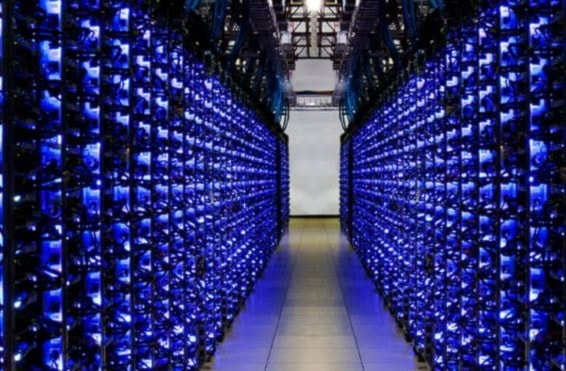Google's emissions rise 50% in five years from AI energy demand
The tech giant's ambition to shrink its climate impact faces challenges as it becomes more dependent on energy-intensive data centers.
-

A Google data center requires significant energy for cooling to ensure it runs as efficiently as possible. (Google/Rex)
Google's efforts to reduce its climate impact are at risk due to its increasing reliance on energy-intensive data centers to support new artificial intelligence products.
The tech giant disclosed on Tuesday that its greenhouse gas emissions have surged by 48% over the last five years. Google attributed the rise primarily to electricity consumption by data centers and emissions from its supply chain.
According to its annual environmental report, emissions in 2023 rose by 13% compared to the previous year, reaching 14.3 million metric tons.
The technology company, which has made substantial investments in AI, acknowledged that achieving its "extremely ambitious" goal of reaching net zero emissions by 2030 will be challenging. It highlighted "significant uncertainty," particularly regarding the future environmental impact of AI, which is intricate and challenging to forecast.
Dive deeper
Since 2019, Google's emissions have increased by nearly 50%, which was the base year for its goal of achieving net zero emissions by balancing CO2 removal with emissions. According to the International Energy Agency, total electricity consumption by data centers could double from 2022 levels to 1,000 terawatt-hours (TWh) by 2026, roughly equivalent to Japan's electricity demand. Research from SemiAnalysis suggests that AI-related activities could lead data centers to consume 4.5% of global energy generation by 2030.
Data centers are pivotal in the development and operation of AI models, such as Google's Gemini and OpenAI's GPT-4, which powers the ChatGPT chatbot. Microsoft recently acknowledged that the energy consumption associated with its data centers was jeopardizing its ambitious goal of achieving carbon negativity by 2030. Brad Smith, Microsoft's president, conceded in May that the company's AI strategy had shifted the goalposts, altering their initial plans.
Big tech firms are increasingly committing to renewable energy purchases to fulfill their climate objectives. However, efforts to cut CO2 emissions are facing challenges due to substantial investments in AI products. These technologies demand significant energy for training and deployment in data centers, alongside carbon emissions linked to manufacturing and transporting the necessary computer servers and chips.
Another environmental concern in the AI industry is water usage, with one study projecting that AI activities could consume up to 6.6 billion cubic meters of water by 2027—nearly two-thirds of England's annual consumption.
Read next: 'Godfather of AI' warns of tech dangers; quits Google

 3 Min Read
3 Min Read









